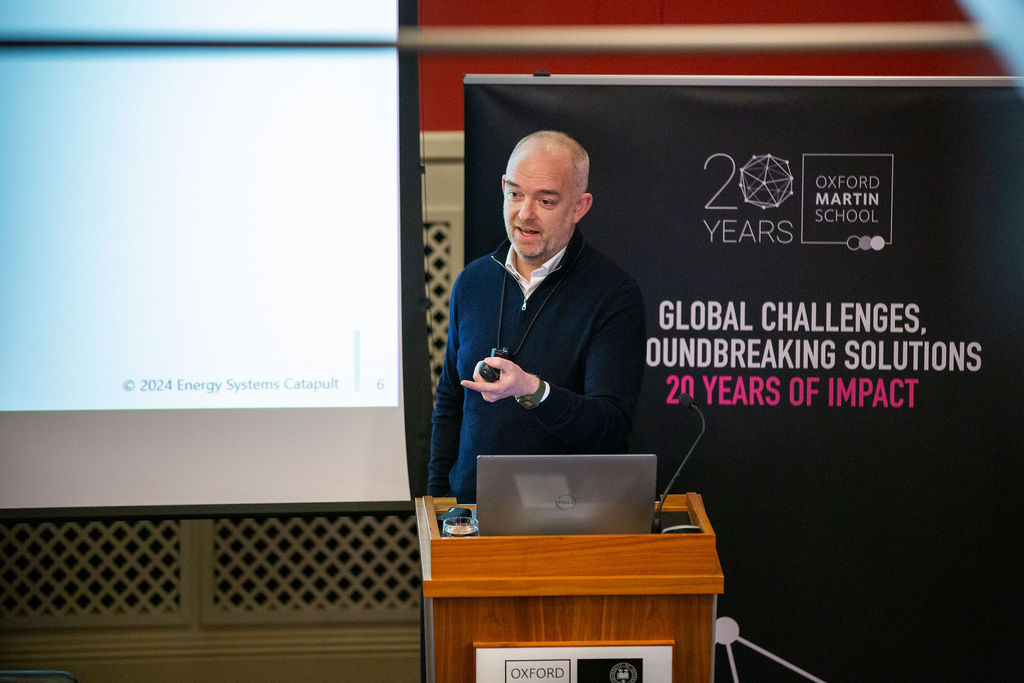Guy Newey Lecture: How Government decisions really get made and what it means for Net Zero

The Oxford Sustainable Finance Group hosted a talk by Guy Newey, CEO of the Energy Systems Catapult, on Wednesday 4 February at the Oxford Martin School, followed by a reception. Newey’s talk, titled “How Government decisions really get made and what it means for Net Zero,” explored the increasingly complex politics of climate action, even […]
Oxford Masterclass on International Carbon Markets

The Masterclass in International Carbon Markets equips professionals with a deep understanding of the complexities and evolving dynamics of reaching global net zero through the use of market mechanisms. It will review the latest developments in international carbon markets, including as a result of the emerging Article 6 regime under the Paris Agreement, providing insights into […]
Masterclass: Environmental Data in Sustainable Finance

Masterclass: Environmental Data in Sustainable Finance Course Directors: Beatrice Crona, Science director, Professor, Stockholm Resilience Centre Christophe Christiaen, Head of Innovation and Impact, CGFI/Head of Spatial Finance Initiative About Financial institutions and regulators are increasingly turning to environmental data and models to assess financial risks, opportunities, and impacts. From climate projections to biodiversity indicators, these datasets […]
How Government decisions really get made and what it means for Net Zero

The Oxford Sustainable Finance Group are hosting a talk by Guy Newey, CEO of the Energy Systems Catapult, on Wednesday 4 February at the Oxford Martin School, followed by a reception. Guy’s talk is titled ‘How Government decisions really get made and what it means for Net Zero.’ The politics of climate action are increasingly […]
Mark Carney’s journey from climate ‘visionary’ to pipeline promoter

Ben Caldecott, director of the Oxford Sustainable Finance Group, was quoted in a recent article on Mark Carney’s climate record, highlighting Carney’s role in advancing climate‑related financial practices and noting the impact of his initiatives on major institutions. You can read Caldecott’s full remarks here.
Annual Christmas Reception

The Oxford Sustainable Finance Group opened invitations to their Christmas Reception for friends and supporters, which was held on Thursday, 11th December, at Oriel College, Oxford. The event celebrated a successful year with colleagues, students, collaborators, supporters, and funders. Drinks were served in the Beer Cellar, followed by a formal dinner in the Dining Hall. […]
The political economy of venture capital: winners-take-all and founder control

A new article published in Socio-Economic Review sheds fresh light on how tech founder-CEOs such as Mark Zuckerberg and Elon Musk have maintained control over some of the world’s most powerful technology firms. In his article, “The political economy of venture capital: winners-take-all and founder control,” Dr David Kampmann argues that the venture capital market […]
What are we measuring? Measurement and aggregation issues in economics, with an application to climate risks

New discussion paper reviews the twin challenges of measurement and aggregation in economics and the natural sciences, with climate risk as a guiding example. Authors: Eddie Gerba and Gireesh Shrimali This paper synthesises a broad range of theoretical and empirical perspectives, tracing ideas from early systems theory to modern macroeconomic debates, and compares the approaches […]
Christmas Reception

The Oxford Sustainable Finance Group has opened invitations to their Christmas Reception for friends and supporters being held on Thursday 11th December at Oriel College, Oxford. We will celebrate a successful year with colleagues, students, collaborators, supporters, and funders. Drinks will be served from 18.30–19.30 in the Beer Cellar followed by a formal dinner in […]
Masterclass on Artificial Intelligence in Sustainable Finance

Masterclass on Artificial Intelligence in Sustainable Finance Course Directors: Dr Julie Bingler, Research Associate in Financial Risk Data Analytics. Christophe Christiaen, Head of Innovation and Impact, CGFI/Head of Spatial Finance Initiative About Artificial intelligence (AI) is rapidly becoming a key driver of innovation in sustainable finance, offering new ways to understand the impact of complex […]
